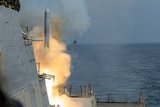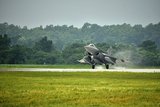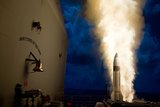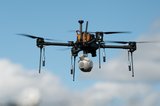UK says Saky explosions leave Russian Navy Black Sea aviation fleet 'significantly degraded'
Satellite imagery of Saky airfield in the aftermath of explosions and damage to Russian fighter jets. (Photo: Maxar)
A series of explosions at the Russian operated Saky airfield, western Crimea, has led to the Russian Navy's Black Sea aviation fleet being 'significantly degraded,' according to a new UK MoD intelligence report.
The cause of the explosions, which occurred on 9 August, are said to be unclear, but 'mushroom clouds' captured by eyewitness videos are 'almost certainly' a result of up to four uncovered munition storage areas being detonated, added the MoD.
It noted that five Su-24 Fencer fighter-bombers and three Su-30 Flanker H multirole fighters were 'almost certainly' destroyed or 'seriously damaged' from the explosions.
'The loss of eight combat jets represents a minor proportion of the overall fleet of aircraft Russia has available to support the war,' said the UK MoD. 'However, Saky was primarily used as a base for the aircraft of the Russian Navy's Black Sea Fleet. The fleet's naval aviation capability is now significantly degraded.'
Such was the seriousness of the incident that the UK predicts Russia will move to 'revise its threat perception.'
London explained that Crimea 'has probably been seen as a secure rear-area' before the Saky explosions.
Related Equipment in Defence Insight
More from Defence Notes
-
![India’s strategic defence footprint expansion could be accelerated by Iran-Israel conflict]()
India’s strategic defence footprint expansion could be accelerated by Iran-Israel conflict
The latest escalation between Iran and Israel could shape New Delhi’s next-generation shield as India deepens cooperation with Israel on missile defence and drone production.
-
![Is the US magazine of air defence interceptors deep enough to sustain a long campaign against Iran?]()
Is the US magazine of air defence interceptors deep enough to sustain a long campaign against Iran?
The Pentagon spent a considerable number of THAAD and SM-3 rounds to attack Iran in 2025 and has not fully replenished its reserves.
-
![New Zealand buys tri-service uncrewed kit from Syos Aerospace]()
New Zealand buys tri-service uncrewed kit from Syos Aerospace
As uncrewed technology continues to play an increasingly central role in modern military activities, New Zealand’s recent acquisitions point towards its the force’s focus on cost-effective capability.
-
![Golden Dome for America hits one-year mark but key questions remain on its progress]()
Golden Dome for America hits one-year mark but key questions remain on its progress
Integration issues, bureaucracy and undefined policies and authorities could hamper the full implementation of the “shield” to defend the US territory against aerial threats.
-
![US Air Force pushes Sentinel’s initial capability to early 2030s despite China’s nuclear progress]()
US Air Force pushes Sentinel’s initial capability to early 2030s despite China’s nuclear progress
While the US struggles to modernise the 50-year-old land leg of its nuclear triad, China has been rapidly developing and fielding new nuclear capabilities.
-
![New opportunities for defence firms as EU steps up support for Ukraine]()
New opportunities for defence firms as EU steps up support for Ukraine
The European Commission is looking for startups and other innovators to address challenges across the land, air and sea domains.























